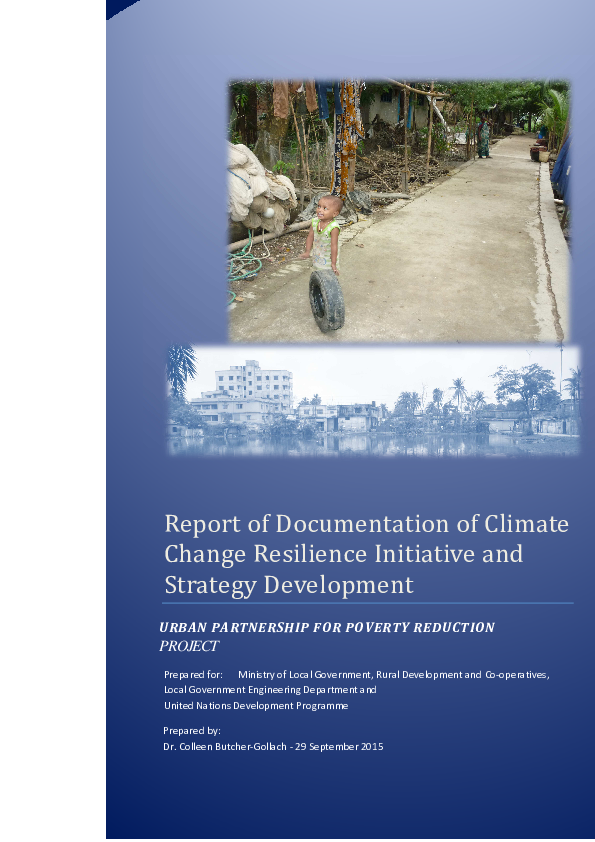Resources
Report of Documentation of Climate Change Resilience Initiative and Strategy Development
Posted on September 29, 2015

The Urban Partnerships for Poverty Reduction (UPPR) has been implemented over a seven yearperiod (2008-2015) with funding from participating communities (15 percent), City Corporations/Town Municipalities (20 percent) and UKAid and UNDP (65 percent). The goal of UPPR was toreduce urban poverty in Bangladesh by improving the livelihoods and living conditions of 3 millionurban poor and extremely poor people, especially women and girls, living in 23 cities and towns.The theory of change behind the project was that the urban poor are best placed to judge their ownneeds and to identify who is most in need of support. As poverty in Bangladesh is the consequenceof multiple and at times inter-related causes, i.e. is multi-dimensional, the objectives of the projectwere broad-ranging and aimed at better connecting the poor to basic services, the job market andlivelihood opportunities, and the wider city and the political-economy relationships and decisionmakingprocesses by which limited resources are prioritized and allocated amongst residents1:i) Urban poor communities are mobilized and supported to form representative, inclusive andwell-managed groups;ii) Poor urban communities are supported to create healthy and secure living environments(including planning and constructing community driven infrastructure);iii) Urban poor and extremely poor people are supported to acquire the resources, knowledgeand skills needed to increase their incomes and assets; andiv) Development and implementation of pro-poor policies and practices are supported inpartnership with others, including the formation of town level partnerships.UPPR originally was scheduled to close in August 2014. In order to ensure the sustainability of itsinterventions and results, a 12 month extension to the project was approved to a new closing dateof 31 August 2015 (when the project did close). Specifically, the purpose of the extension was toallow for the completion of all core activities, to develop and implement a comprehensivesustainability plan, and to allow more opportunities to effectively communicate UPPR’s results,experience and recommendations to those taking over and supporting urban poverty reductionstrategies in the future. The extension would allow UPPR to strengthen its approach andsustainability in six areas, namely:i) Further strengthening community organisations and capacity of local governmentinstitutions; ii) Integrate communities it has lifted from urban poverty into the wider urban structurethrough government ward level planning initiatives in a number of towns;iii) Assess the resilience of poor urban communities, particularly around climate change in anumber of towns;iv) Enhance cooperation with the private sector in relation to poor urban communities;v) Pilot models for security of tenure and access to housing and document successes; andvi) Build on measuring and reporting project results and effectively communicating morecomprehensively evidence-based results, lessons learned, and proven tools for urbanpoverty reduction planning and sustainability in order to address widely held misconceptionsamong policy makers about slums and how to assist the urban poor.The purpose of the assignment (Documentation of Climate Resilience Initiative and StrategyDevelopment) is to address sustainability area iii) above. It provides a review and analysis of thework steps, methodology and process of climate change resilient arrangements introduced by theUPPR from mid-2014 onwards in the four pilot towns of Chittagong, Rajshahi, Sirajgonj and Comilla.Based on an identification of emerging issues from the analysis, a strategy is recommended forfurther building the capabilities and understanding of communities and responsible local agenciesfor climate change adaptation and resilience strengthening measures. The strategy, in keeping withthe UPPR approach, targets low income groups, seeks to incentivize community-led resiliencemeasures to reduce vulnerabilities, and recommends ways in which to integrate such considerationsinto future programming of interventions by a proposed UPPR-successor programme, namely theNational Urban Poverty Reduction Programme (NUPRP). This full Report now documents and analyzes the effectiveness and efficiency of the UPPR climateresilience activities and processes, explores specific case studies in the four pilot cities/towns inorder to cameo emerging issues, and identifies improvements that could be made when deliveringsimilar activities in the future. Wherever relevant, it draws on ‘best practice’ from the Region and4internationally for engaging in pro-poor climate resilience strengthening. Although the assignmentTOR were limited to a review of the processes in the four cities/towns of Chittagong, Comilla,Rajshahi and Sirarjgonj, a rapid field assessment also was undertaken of climate induced migrationin Karail, Dhaka. Rapid desk assessments were made of the Gopalgonj Mandartola resettlement oftwo evicted communities to safer areas, and the multi-hazard risk assessments and Climate ResilientAction Plans prepared with the communities of Khulna City Corporation, Barisal City Corporation,Narayanganj City Corporation and Dinajpur Pourashava.